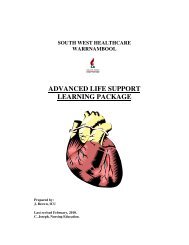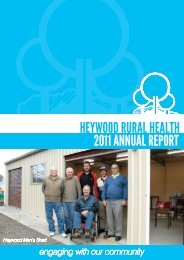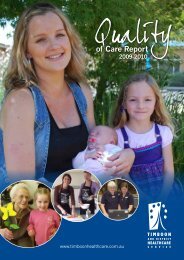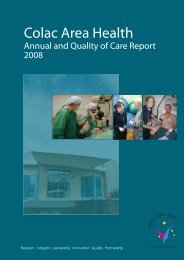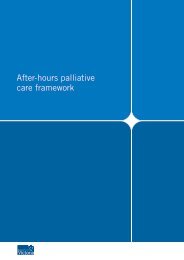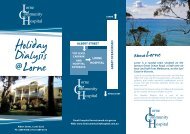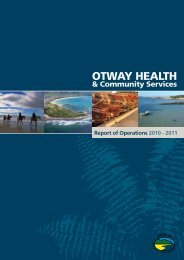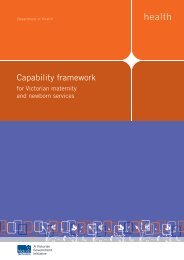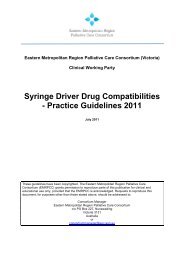Self Directed Learning Package - University of Queensland
Self Directed Learning Package - University of Queensland
Self Directed Learning Package - University of Queensland
- No tags were found...
You also want an ePaper? Increase the reach of your titles
YUMPU automatically turns print PDFs into web optimized ePapers that Google loves.
45 • <strong>Self</strong> <strong>Directed</strong> <strong>Learning</strong> <strong>Package</strong> - Introductory Registered & Enrolled NurseDoManage the problemIt may be appropriate to treat the cause <strong>of</strong> delirium (if it isknown). However, at the end <strong>of</strong> life simple measures aimed atmanaging the symptoms may be preferable.Thinking PointImagine you are Alfred. It is night-time and you arelying in your bed. It is dark, no one is around and youare confused, frightened and not sure where you are.You hear noises outside your door that sometimesdisturb you. Perhaps you want to get out <strong>of</strong> bed t<strong>of</strong>ind somewhere better to be.Look at the list below. Which <strong>of</strong> these measuresmight help you feel less confused and anxious?Environmental strategies 14• appropriate lighting• minimise noise especially at night• provide a clock that the resident can see• avoid room or location changes and keep personal andfamiliar objects in view• modify the environment to minimise the risk <strong>of</strong> injurye.g. low bed in the lowest position with cot sides down, bedagainst the wall, potential hazards such as beside tablesremoved.Clinical strategies 14• address anxiety; residents with delirium are <strong>of</strong>ten veryfrightened• manage discomfort or pain• minimise sensory deficits by providing and assisting withhearing and visual aidse.g. clean spectacles and remove wax deposits in hearing aids,check batteries are fresh and hearing aid is turned on• encourage the presence <strong>of</strong> people known to the residente.g. family and friends and regular staff members• reassure and reorientate resident• explain delirium and reassure the resident and their family• AVOID use <strong>of</strong> physical restraints• use interpreters and communication aids for residents withCulturally and Linguistically Diverse needs (CALD)• promote relaxation and sufficient sleepe.g. assisted by massage and/or encouraging wakefulnessduring the day• minimise use <strong>of</strong> indwelling catheters• review medicatione.g. cease or reduce all non essential medications, swap to adifferent opioid analgesic medication.Medications 13,14The primary aim is to reduce the resident’s distress by targetingany agitation or hallucinations.Antipsychotic drugs such as haloperidol, risperidone orolanzapine are considered first line therapy.Benzodiazepines do not improve cognition but may helpassociated anxiety. Short acting agents such as lorazepam ormidazolam are usually indicated.Key PointBenzodiazepines may worsen delirium if not used incombination with an antipsychotic drug.Sometimes agitation and delirium can cause severe distress anddoes not respond to medical management, especially in theterminal phase. This is a challenging problem and may requiresedation as the only appropriate intervention.Key PointConsult “Therapeutic Guidelines: Palliative Care”for additional and comprehensive prescribingrecommendations.Version 3 <strong>of</strong> these guidelines is included in thePA Toolkit.



